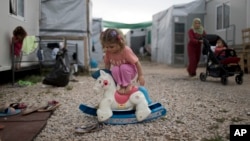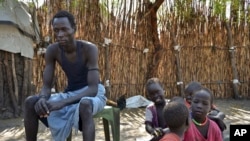The U.N. children's fund is asking for $3.6 billion to support 82 million people, including 48 million children trapped in situations of conflict, natural disasters and other catastrophic emergencies.
The U.N. children's fund says 84 percent of the appeal will go to humanitarian crises driven by conflict.The largest portion of the appeal, $1 billion, will support 5.5 million Syrian refugees, half of them children, in neighboring countries.
Other major beneficiaries include Yemen, South Sudan, Somalia, Democratic Republic of Congo, Iraq and Nigeria.
UNICEF Deputy Executive Director Omar Abdi says children caught up in war and other disasters are extremely vulnerable to many life-threatening risks.
"The impact of war, natural disasters and climate change continue to force children to flee their homes, trapping them behind conflict lines and putting them at risk of disease, violence and exploitation," said Abdi. "An increasingly worrying trend is that children in war zones have come under attack at a shocking scale throughout the year."
While bullets and bombs pose a direct threat to children, UNICEF Director of Emergency Programs Manuel Fontaine says more children die from water-borne diseases than from conflict.
"We also know that poor quality water is a major driver of malnutrition.This is the usual cycle," said Fontaine. "A child drinks poor quality water, gets diarrhea, gets dehydrated, does not feed himself or herself, gets malnourished and then goes into severe malnutrition.So, we know that clean water is an extremely important determinant of good nutrition and health."
UNICEF provides more than half of the emergency water, sanitation and hygiene services in humanitarian crises around the world.That will remain a priority throughout the year.
The multi-billion-dollar appeal also will be used to support services such as health clinics, vaccination programs, nutrition, emergency education and psycho-social care.





